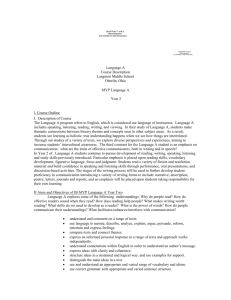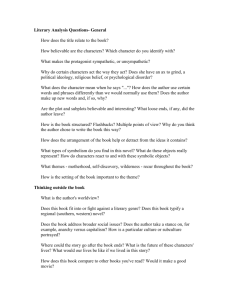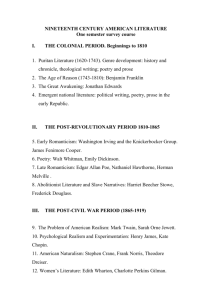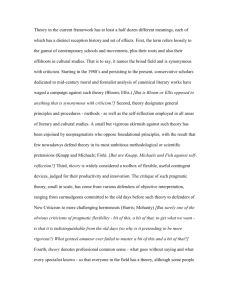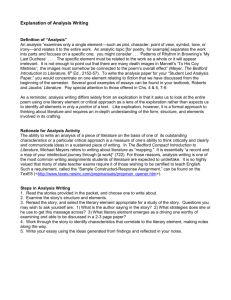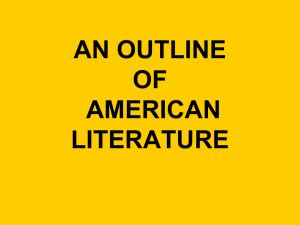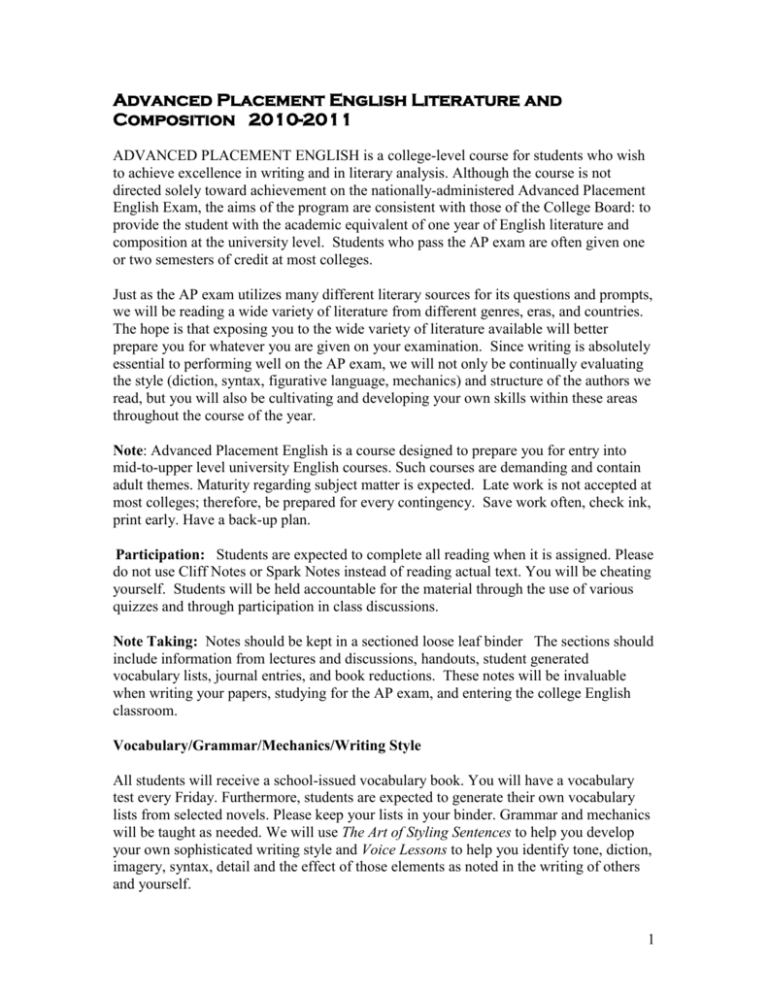
Advanced Placement English Literature and
Composition 2010-2011
ADVANCED PLACEMENT ENGLISH is a college-level course for students who wish
to achieve excellence in writing and in literary analysis. Although the course is not
directed solely toward achievement on the nationally-administered Advanced Placement
English Exam, the aims of the program are consistent with those of the College Board: to
provide the student with the academic equivalent of one year of English literature and
composition at the university level. Students who pass the AP exam are often given one
or two semesters of credit at most colleges.
Just as the AP exam utilizes many different literary sources for its questions and prompts,
we will be reading a wide variety of literature from different genres, eras, and countries.
The hope is that exposing you to the wide variety of literature available will better
prepare you for whatever you are given on your examination. Since writing is absolutely
essential to performing well on the AP exam, we will not only be continually evaluating
the style (diction, syntax, figurative language, mechanics) and structure of the authors we
read, but you will also be cultivating and developing your own skills within these areas
throughout the course of the year.
Note: Advanced Placement English is a course designed to prepare you for entry into
mid-to-upper level university English courses. Such courses are demanding and contain
adult themes. Maturity regarding subject matter is expected. Late work is not accepted at
most colleges; therefore, be prepared for every contingency. Save work often, check ink,
print early. Have a back-up plan.
Participation: Students are expected to complete all reading when it is assigned. Please
do not use Cliff Notes or Spark Notes instead of reading actual text. You will be cheating
yourself. Students will be held accountable for the material through the use of various
quizzes and through participation in class discussions.
Note Taking: Notes should be kept in a sectioned loose leaf binder The sections should
include information from lectures and discussions, handouts, student generated
vocabulary lists, journal entries, and book reductions. These notes will be invaluable
when writing your papers, studying for the AP exam, and entering the college English
classroom.
Vocabulary/Grammar/Mechanics/Writing Style
All students will receive a school-issued vocabulary book. You will have a vocabulary
test every Friday. Furthermore, students are expected to generate their own vocabulary
lists from selected novels. Please keep your lists in your binder. Grammar and mechanics
will be taught as needed. We will use The Art of Styling Sentences to help you develop
your own sophisticated writing style and Voice Lessons to help you identify tone, diction,
imagery, syntax, detail and the effect of those elements as noted in the writing of others
and yourself.
1
Reading Journals
A reading journal is a daily reflection of your reading for English class. This is a crucial
part of your learning, for it engages you with the texts critically and thoughtfully and
allows me to monitor your progress. Your journal is due before each discussion session.
Good journals look beneath the surface of the text; they explore its ideas, patterns, and
implications; they show the fruits of careful reading; they demonstrate a mind at work.
Consider the insights gleaned from reading How to Read Literature Like a Professor. A
good journal asks good questions to prepare for future literary circles and demonstrates
your search to understand and explain the text. Bad journals are often unacceptably brief,
show little or no real thought, tend to summarize the plot, are general and shallow, and
show little active engagement with the text. Journal entries will be kept in a separate
section of your loose leaf binder. Each entry must have a clear title and date. They are
graded on a ten-point scale: 1 = very poor, 5= average, 10 = excellent.
Your journal will also contain the daily quotes I put on the board and your response and
comments. Quotes should be labeled by the week.
Historical Time Period and Cultural Studies
For the texts that we study, we will determine the time period and the relevance of history
and culture on the work. The novels that we read will be introduced in chronological
order so that we can see the progression of thought and culture in the western world.
One of the major papers will ask you to consider the historical and cultural values
embodied in one of our novels. Because the junior level English classes focus on
American literature, such literature will not be heavily emphasized in this course.
Book Reduction
You will fill out a Book Reduction sheet for every novel, short story, and play that we
read. These will be collected and graded when we finish each assignment. These sheets
will be valuable as review before the AP exam. To fill out a Book Reduction sheet
properly, you must consider and analyze the work according to these elements: Plot,
Setting, Theme, Tone, Point of View, Characters, Literary Devices, Literary Criticism,
and Personal Reflection. We will use our Kennedy textbook to study the various
elements. These sheets must be completely filled out before we meet for our final literary
discussion on that text. You may, however, add to your sheet any new insights gleaned
from the comments of other students.
2
Major Papers
Using 12 Steps to Better Exposition, A Writer’s Reference, and Writing About Literature,
we will study and workshop writing skills to prepare for your major papers. You will
write at least one major paper every nine weeks. The topics for these papers will come
from the various texts we read, and each paper will have a different analytical focus.
Your thesis statement and rough draft will be turned into me one week after the
assignment is posted. After I return your approved rough copy, you have one week to
type your paper. Use MLA formatting.
Sources must be cited properly. Bring your finished first copy to class on the due date
without your name on it. I will pass out the class papers for peer editing (our standard
writing rubric will be used). You will then get your paper back for further editing on your
part before you turn it in to me for the final grade. Further revisions may be necessary.
The following is a list of the major papers that will be described more thoroughly within
each unit:
1.
2.
3.
4.
Evaluating literature: an analysis of a short story using HTRLLAP
A critique of Hamlet using one of the forms of literary criticism
A position paper based on the explication of a poem
An expository essay on the historical/social values embodied in one of our
novels.
5. An argumentative essay for a novel we should or should not read
In-Class Writings
Approximately once a week, you will be practicing timed essays for the AP exam. These
essays will come from previous AP exams or similar questions generated during class
discussions. Grading will be according to the AP rubric; less emphasis will be placed on
grammatical issues and more on structure and content. This practice will help you
quickly formulate your theses and supporting evidence. I will always give very explicit
commentary on these essays and return them to you for revision. Mechanical and
grammatical errors will be noted, and we will review as a class certain types of errors that
frequently occur. There will also be an emphasis on the specific issue of organization
and varied sentence structure. Historically, these two areas have been an issue for
students when they first begin writing AP essays. There are many ways to help work on
these troublesome areas. We will look collectively as a class at how organization
transitions and sentence structures are varied (or not) in the AP sample essays and why
and how it helps make a better paper. In your own writing, you will be continually
encouraged, through my annotation on your essays, to think about the coherence and
clarity of your papers - not only what ideas you have but how you are putting them
together for your paper. Finally, there will also be times in class when you will be asked
to read a peer’s paper and provide feedback on a given area such as varied sentence
structure and rhetoric (tone and voice). The goal is that in continually receiving and
providing feedback, you will enhance your own skills as a writer.
3
Multiple Choice Tests
Approximately once a month, you will be taking multiple choice tests in anticipation of
the multiple choice section on the AP exam. These tests will aid you in developing the
necessary skills to provide in-depth analysis of prose, poetry, and drama and will build
your literary vocabulary.
Supplemental Texts:
12 Steps to Better Exposition : Barbara Williams: Merrill, 1998 [handouts]
The Art of Styling Sentences: Ann Longknife: Barron’s 4th Ed. 2002 [handouts]
Elements of Literature: Essentials of British and World Literature: Sixth Course: Holt,
Rinehart and Winston, 2007 [All students receive a book.]
How to Read Literature Like a Professor : Thomas Foster : Quill, 2003 [All students
must procure a copy]
Literature: An Introduction to Fiction, Poetry, and Drama 8th Edition : Kennedy and
Gioia: Longman, 2002 [All students receive a book]
Voice Lessons : Classroom Activities to Teach Diction, Detail, Imagery, Syntax, and
Tone: Nancy Dean: Maupin House, 2000 [handouts]
The Western Canon: The Books and Schools of the Ages: Harold Bloom. Riverhead
Books, 1994 [handouts]
Writing About Literature : Edgar Roberts: Pearson/Prentice Hall, 2006 [handouts]
Key Topics of Study & Literature Units:
Unit 1: Introduction to AP Literature:
Lecture Topics: Archetypes, Analyzing Literature based on How to Read Literature Like
a Professor, Expository Writing for the AP Course, Literary Criticism (Formalism,
Biographical, Historical, Psychological, Mythological, Sociological, Gender, Reader-Response,
Deconstruction), Literary Terms
Contemporary Novels: The Curious Incident of the Dog in the Night-Time, The Book
Thief, The Life of Pi
4
Major Paper: Evaluating Literature: You will choose a short story from our Kennedy
literature book and write a major paper analyzing the short story using one or more of the
chapters in How to Read Literature Like a Professor. You will be considering the
author’s use of symbols, motifs, and figurative language. Your paper should also note
the author’s tone, style, and use of other elements. To prepare, we will read and analyze
some short stories as a class including Katherine Mansfield’s “The Garden Party,”
William Faulkner’s “A Rose for Emily,” John Steinbeck’s “The Chrysanthemums,” and
Ursula K. LeGuin’s “The Ones Who Walk Away from Omelas.”
You will first submit a rough draft of your analysis to be reviewed by your peers who
will also be scrutinizing your supporting details and rhetorical choices. I will provide
feedback regarding your organization and the quality of analysis as well as your balance
of generalization and specific, illustrative detail. Your final draft you will be due a week
later for a final grade.
Unit 2: Novels from the Western Canon – intertwining unit
Because much of the drama and poetry units (units 3 & 4) will consist of in-class
reading, students will be reading assigned novels outside of class on an assigned
schedule. Students may read ahead of schedule. Students will keep a daily reading
journal of their reflections of the novel and complete a book reduction. We will have
days in class to discuss the current novel. Those days will be announced ahead of time.
Prompts for timed writings and formal writings will also be drawn from these novels.
Lecture Topics: The historical and cultural backgrounds for each novel and author.
Novels: Robinson Crusoe by Daniel Defoe 1719 (Restoration)
Frankenstein by Mary Shelley 1818 (Romantic)
Jane Eyre by Charlotte Bronte 1847 (Victorian)
The Adventures of Huckleberry Finn by Mark Twain 1884
Invisible Man by Ralph Ellison 1952 (Modern)
Things Fall Apart by Chinua Achebe 1959 (Modern)
Major Paper: Analysis of historical and social impact: You will choose one of the novels
that we have read and discussed. You will write an analysis of the historical and social
impact on the novel and/or the novel’s impact on the future. Consider how the author
embraced the societal beliefs of the time and/or wrote in reaction to them. How was the
work accepted at the time of its original publication and how is it appraised today?
You will first submit a rough draft of your analysis to be reviewed by your peers who
will be scrutinizing the accuracy of your details and rhetorical choices. I can provide
feedback regarding your organization and the quality of analysis as well as your use of
sentence structure. The final draft will be due a week later for a final grade.
Unit 3: Drama
5
Lecture Topics: history of theater, history and culture of ancient Greece, history and
culture of Renaissance, the diverse interpretations ofShakespeare’s plays, the continuing
impact of older pieces, word choice of playwrights, Aristotle’s Concept of Tragedy
Texts: Oedipus Rex, Hamlet, Rosencrantz & Guildenstern are Dead
Major Paper: Literary Criticism: You will choose one of the forms of literary criticism
discussed in our Kennedy text (Formalism, Biographical, Historical, Psychological, Mythological,
Sociological, Gender, Reader-Response, Deconstruction) and will analyze Hamlet using primarily
that style of criticism. You will find at least three professional critiques to use to support
your conclusions. You will share your essay with your classmates to discover the variety
of ways one work can be analyzed.
You will first submit a rough draft of your analysis to be reviewed by your peers who
will be scrutinizing your sentence structure and your balance of general and specific
detail. I will provide feedback regarding your use of quotes from your sources, the
quality of your analysis and your use of transitional phrases. The final draft will be due a
week later for a final grade.
Unit 4: Poetry
We will be reading poetry to help you develop skill and fluency in poetic analysis.
Hopefully you will gain an appreciation of poetry through a close study of the details of
each poem. You need not understand every poem, but you should read each one carefully
and show thoughtful analysis. You should focus on the techniques and meanings of the
poems as well as on your personal or emotional responses. We will study the TPCAST
(Title, Paraphrase, Connotation, Attitude, Shifts, Theme) method as one way to analyze
poems. We will also consider the historical and social framework of some of the poems.
Major paper: Poetry Explication
You will write an explanation poem in the form of a three page analysis; responses
should be thoughtful and should address the poem itself: form, meanings, ideas,
language, content, and so on. Before undertaking this project, though, we will read
excerpts (from Harold Bloom’s The Western Canon) regarding poetry to provide a model
in writing literary criticism. We will scrutinize Bloom’s criticism and look at what
rhetorical choices he makes and how they support his position(s) appropriately or not.
After working through the Bloom excerpts, students are expected to first submit a rough
draft of their analysis which I will provide feedback upon regarding how effectively tone
and voice are used. The second and subsequent draft will be reviewed by your peers who
will also be scrutinizing your rhetorical choices. The third and final draft you will be
turning in for a final grade.
After we finish each section, I will ask you to write your own poem in the form studied.
For example: Section One: The Villanelle. We will read and analyze Robinson’s “The
House on the Hill”, Roethke’s “The Waking”, Bishop’s “One Art”, and Thomas’s “Do
6
Not Go Gentle into That Good Night”. You will then write your own villanelle and
submit to me. I will make corrections/suggestions, and then you will revise your poem.
1. The Villanelle: Edwin Arlington Robinson: “The House on the Hill”, Theodore
Roethke: “The Waking”, Elizabeth Bishop: “One Art”, Dylan Thomas: “Do Not
Go Gentle into That Good Night”
2. The Sestina: Miller Williams: “The Shrinking Lonesome Sestina”, Elizabeth Bishop,
“Sestina”
3. The Sonnet: Shakespeare, Percy Bysshe Shelley: “Ozymandias”, John Keats: “Bright
Star”, Elizabeth Barrett Browning: “XLIII”, Edna St. Vincent Millay: “What lips
my lips have kissed, and where and why”, Seamus Heaney: “The Haw Lantern”,
John Milton: “On His Blindness”, William Wordsworth: “The World Is Too
Much for Us”
4. The Ballad: “Lord Randall”, “Edward, Edward”, Gwendolyn Brooks: “We Real
Cool”, Samuel Taylor Coleridge: The Rime of the Ancient Mariner, Clement C.
Moore: “The Night Before Christmas”
Blank Verse:
1. Shakespeare: selected sections
2. John Milton: Paradise Lost, excerpt
3. William Wordsworth: “Lines Composed a Few Miles Above Tintern Abbey”
Free Verse:
Walt Whitman: selected sections
The Heroic Couplet:
1. Anne Bradstreet: “The Author to Her Book”
2. Alexander Pope: An Essay on Criticism
3. Robert Browning: My Last Duchess
The Stanza:
1. Thomas Wyatt: “They Flee from Me”
2. William Blake: “The Tyger”, “The Lamb”, “A Poison Tree”
3. Lord Byron: “So We’ll Go No More A-Roving”
4. Emily Dickinson: “I died for Beauty”, “We Grow Accustomed to the Dark”
5. Robert Frost: “Acquainted with the Night”
5. Thomas Hardy: “The Convergence of the Twain”
6. Robert Hayden: “Those Winter Sundays”
Shaping Forms:
7
1. The Elegy: Ben Johnson: “On My First Son”, Thomas Gray: “Elegy Written in a
Country Churchyard”, Walt Whitman: “O Captain! My Captain!” John Crowe
Ransom: “Bells for John Whiteside’s Daughter”, Edgar Allan Poe: “Annabel Lee”
2. The Pastoral: Christopher Marlowe: “The Passionate Shepherd to His Love”, Andrew
Marvell: “The Garden”, William Wordsworth: “To My Sister”, John Keats: “Ode
on a Grecian Urn”, Ted Hughes: “The Thought-Fox”
3. The Ode: Percy Bysshe Shelley: “Ode to the West Wind”, John Keats: “To Autumn”,
Marianne Moore: “The Paper Nautilus”, Robert Pinsky: “Ode to Meaning”
Open Forms:
1. Langston Hughes: “I, Too”
2. William Carlos Williams: “Spring and All”
3. Sylvia Plath: “Daddy”
4. Adrienne Rich: “Diving into the Wreck”
5. Frank O’Hara: “Ave Maria”
Poems about Poetry:
1. Archibald MacLeish: “Ars Poetica”
2. Marianne Moore: “Poetry”
3. Robert Graves: “The Bards”
4. Dylan Thomas “In My Craft or Sullen Art”
War Poems:
1. Ralph Waldo Emerson: “The Concord Hymn”
2. Walt Whitman: “Drum Taps”
3. Robert Frost: “The Soldier”
4. Robert Graves: “Recalling War”
5. Thomas Hardy: “Channel Firing”
6. Wilfred Owens: “Dulce et decorum est”
7. Carl Sandburg: “Smoke”
8. Henry Reed: “Naming of Parts”
9. Karl Shapiro: “Elegy for a Dead Soldier”
10. Richard Wilbur: “Mined Country”
11. Wallace Stevens: “The Soldier’s Wound”
Unit 5 Final Paper:
8
You will select a book from the list below and read it. You will fill out a Book Reduction
sheet and write a position paper on whether your novel should be added to next year’s
curriculum. This project is the culmination of everything you’ve learned in AP
Literature! Your essay should consider literary elements, connections, allusions,
historical references, literary criticism, and personal reflection.
Reading List for Final Paper:
1.
2.
3.
4.
5.
6.
7.
8.
9.
10.
11.
12.
13.
14.
15.
16.
17.
18.
19.
20.
The Age of Innocence by Edith Wharton
All the King's Men by Robert Penn Warren
Anna Karenina by Leo Tolstoy
Billy Budd by Herman Melville
Crime and Punishment by Fyodor Dostoevski
David Copperfield by Charles Dickens
Ethan Frome by Edith Wharton
Great Expectations by Charles Dickens
Heart of Darkness by Joseph Conrad
The House of Seven Gables by Nathaniel Hawthorne
Madame Bovary by Gustave Flaubert
Moby Dick by Herman Melville
Moll Flanders by Daniel Defoe
Native Son by Richard Wright
Pride and Prejudice by Jane Austen
Portrait of the Artist as a Young Man by James Joyce
Tess of the D'Urbervilles by Thomas Hardy
Their Eyes Were Watching God by Zorah Neale Hurston
Sula by Toni Morrison
Wuthering Heights by Emily Bronte
9



